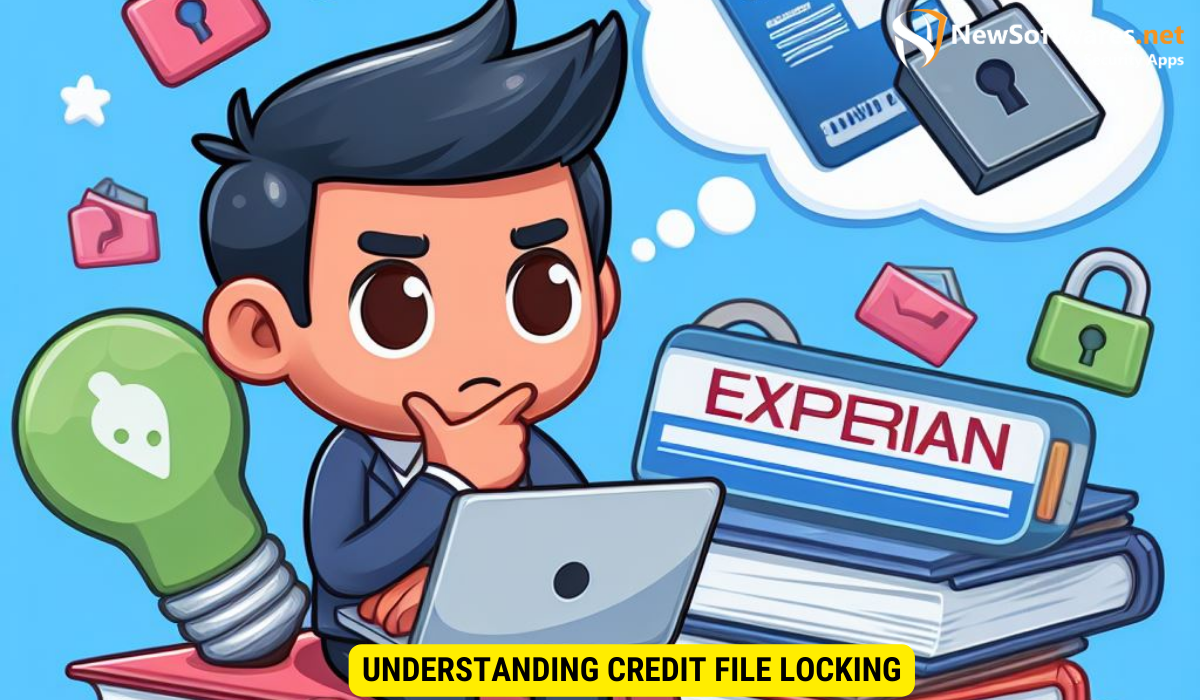It depends on your need for added security. Locking your Experian credit file can provide protection against unauthorized access, but it may also have limitations and potential drawbacks.
In today’s digital world, ensuring the security of our personal information is of utmost importance. With the increasing number of data breaches and identity theft incidents, it’s no wonder that many individuals are taking steps to protect their credit files. One such method is locking your Experian credit file. But is it really necessary? I will explore the pros and cons of credit file locking, how to lock and unlock your Experian credit file, alternative options, and answer some frequently asked questions to help you make an informed decision.
Understanding Credit File Locking

Before diving into the specifics, let’s first understand what credit file locking entails. In simple terms, credit file locking is a security feature that restricts access to your credit file, making it difficult for unauthorized individuals to open new accounts or make changes to your existing accounts.
Credit file locking is a crucial tool in safeguarding your financial information and protecting yourself from identity theft. By implementing a credit file lock, you are essentially putting a padlock on your credit report, ensuring that only authorized parties can access it.
What is Credit File Locking?
Credit file locking is essentially a proactive measure that provides an extra layer of security to your personal information. When your credit file is locked, potential lenders and creditors are unable to access your credit report without your consent. This can help prevent identity thieves from using your information to apply for credit in your name.
Furthermore, credit file locking is a reversible process, allowing you to temporarily lift the lock when you need to authorize a credit check for a legitimate purpose, such as applying for a loan or a new credit card. This flexibility ensures that you can still access credit when needed while maintaining control over who can view your credit report.
The Role of Experian in Credit File Locking
As one of the three major credit bureaus, Experian offers a credit file locking service known as Experian CreditLock. By choosing to lock your Experian credit file, you can gain more control over who has access to your credit report, thereby reducing the risk of identity theft and fraudulent activity.
Experian CreditLock also provides real-time monitoring alerts, notifying you of any suspicious activity or inquiries on your credit report. This added layer of protection ensures that you can respond promptly to any potential threats to your financial security, giving you peace of mind knowing that your credit information is being actively monitored and safeguarded.
The Pros and Cons of Locking Your Experian Credit File
Like any financial decision, there are advantages and potential drawbacks to consider before deciding to lock your Experian credit file. Let’s take a closer look at both sides of the coin:
Advantages of Locking Your Credit File
1. Increased Security: By locking your Experian credit file, you significantly reduce the risk of unauthorized individuals accessing your credit report and potentially using your information for fraudulent purposes. This added layer of security can help safeguard your financial well-being and protect you from identity theft.
2. Peace of Mind: Knowing that you have taken proactive steps to secure your personal information can provide a sense of relief and peace of mind. With the increasing prevalence of data breaches and identity theft cases, having control over your credit file can alleviate some of the anxiety associated with the potential misuse of your sensitive data.
3. Control Over Access: With a locked credit file, you have greater control over who can access your credit report. This can be particularly helpful if you’re concerned about the security of your data and want to limit the number of entities that have access to your financial information. By carefully managing who can view your credit report, you can reduce the risk of your data falling into the wrong hands.
4. Easy Access to Unlock: In case you need to grant access to your credit file to a specific lender or creditor, unlocking your Experian credit file is a straightforward process. Experian CreditLock provides a user-friendly interface that allows you to easily unlock your credit file when necessary, ensuring that you can quickly and efficiently provide access to authorized parties without unnecessary delays.
5. Free Service: Experian CreditLock is currently available for free, making it an attractive option for those looking to enhance their credit file security without any additional costs. This means that you can enjoy the benefits of credit file locking without having to worry about any financial burden, allowing you to focus on protecting your credit and personal information without breaking the bank.
Potential Drawbacks of Credit File Locking
1. Limited Protection: While credit file locking can be effective in preventing new accounts from being opened in your name, it does not provide complete protection against all forms of identity theft. It is important to remember that credit file locking is just one tool in your arsenal against identity theft and should be complemented with other security measures, such as regularly monitoring your credit report and using strong passwords.
2. Restricted Access: Keep in mind that by locking your Experian credit file, you also limit access to your credit report for legitimate entities, such as potential lenders or landlords. While this can be seen as a positive aspect in terms of security, it may require additional steps to grant access when necessary. It is essential to plan ahead and be prepared to temporarily unlock your credit file when you anticipate the need for credit checks by authorized parties.
3. Not a Comprehensive Solution: Credit file locking should be seen as just one tool in your overall strategy for protecting your personal information. While it provides an additional layer of security, it is important to also consider other security measures, such as regularly monitoring your credit report for any suspicious activity, using strong and unique passwords for your financial accounts, and being cautious when sharing personal information online. By adopting a comprehensive approach to security, you can further minimize the risk of identity theft and ensure the safety of your financial well-being.
By carefully weighing the advantages and potential drawbacks of locking your Experian credit file, you can make an informed decision that aligns with your personal security needs and financial goals. Remember, protecting your credit and personal information is an ongoing process, and it is essential to stay vigilant and proactive in safeguarding your financial well-being.
How to Lock Your Experian Credit File

If you’ve weighed the pros and cons and decided that locking your Experian credit file is the right choice for you, here is a step-by-step process to help you get started:
Step 1: Create an Experian Account
To utilize Experian CreditLock, you’ll need to create an account with Experian. Visit their website and follow the registration process to set up your account.
Step 2: Verify Your Identity
Experian will require you to provide certain personal information to verify your identity. This may include details from your credit history, such as previous addresses or loan accounts.
Step 3: Enable CreditLock
Once your identity is verified, you can proceed to enable CreditLock for your Experian credit file. This can usually be done by accessing the security settings within your account dashboard.
Step 4: Confirm Credit File Lock
After enabling CreditLock, take the time to confirm that your credit file is indeed locked. Double-check your account settings to ensure that the lock has been successfully applied.
Step 5: Keep Your Account Secure
Lastly, it is crucial to keep your Experian account secure to prevent any unauthorized changes to your credit file. Regularly update your password and be cautious of phishing attempts or suspicious activities.
Unlocking Your Experian Credit File
If you need to temporarily unlock your Experian credit file to authorize access for a specific lender or creditor, the process is typically straightforward. Simply log in to your Experian account, navigate to the CreditLock settings, and follow the instructions to unlock your credit file for a specified period of time. Once the authorized access period expires, your credit file will automatically re-lock.
Alternatives to Locking Your Experian Credit File
While credit file locking may be a suitable option for many individuals, it’s important to explore alternative methods to safeguard your credit and personal information. Some popular alternatives include:
Credit Monitoring Services
Credit monitoring services allow you to keep a close eye on your credit report for any suspicious activity or changes. These services typically provide alerts when there are significant changes to your credit file, enabling you to quickly respond to potential instances of fraud.
Fraud Alerts and Credit Freezes
Placing a fraud alert on your credit file alerts potential lenders that you may be a victim of identity theft, prompting them to take extra steps to verify your identity before opening new accounts. Credit freezes, on the other hand, restrict access to your credit report entirely, making it impossible for new creditors to access your information without your authorization.
Key Takeaways
- Locking your Experian credit file can provide added protection against identity theft and fraudulent activity.
- Experian CreditLock offers a free service to lock and unlock your credit file as needed.
- Credit file locking is not a comprehensive solution and should be combined with other security measures.
- Alternative options include credit monitoring services, fraud alerts, and credit freezes.
- Credit file locking does not have a direct impact on your credit score.
FAQs
1. Can I lock my credit file with other credit bureaus?
Yes, you can. Equifax, TransUnion, and Experian offer similar credit lock services.
2. Are there any fees associated with Experian CreditLock?
Yes, there might be. Depending on the plan chosen, Experian CreditLock may have associated fees.
3. Can I unlock my credit file for a specific time period?
Yes, you can. It allows temporary access to your credit report by creditors or lenders.
4. What should I do if I suspect fraudulent activity on my credit file?
Immediately contact the credit bureaus to place a fraud alert and review your credit report for any unauthorized accounts or inquiries.
5. Should I lock my credit file if I’m not actively seeking new credit?
Yes, it’s advisable. Locking your credit file adds an extra layer of security, reducing the risk of identity theft and fraud.
Conclusion
The decision to lock your Experian credit file is a personal one that depends on your individual circumstances and level of concern for the security of your personal information. While credit file locking can provide added peace of mind and control over your credit report, it is important to also consider alternative methods and maintain a comprehensive approach to protecting your credit and personal data. By staying informed and proactive, you can take steps towards enhancing your financial security and minimizing the risk of identity theft.
